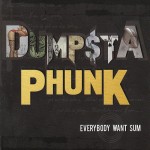
Quick. Think of the worst smelling spot in New Orleans. Funkier than that one unfortunate spot of land at The Fly right behind the elephant patch at the Audubon Zoo. Think the intersection of Bourbon and Conti during Mardi Gras, and then think of the receptacles those trash heaps get thrown into.
Dumpstaphunk is that funky.
Right off the bat, the verses in the opener “Sheez Music” trigger memories of Brothers Johnson’s “Ain’t We Funkin’ Now” with the involuntary leg motions to match. Most folks by now know the sheer power of Dumpstaphunk’s live show, but this track and others here sound huge coming out of the Maple Leaf’s house speakers between sets at their Sunday crawfish boils.
Some might take the Neville bait and compare Everybody Want Sum to the Meters’ later Warner Brothers albums, New Directions and Trick Bag, but a better comparison would be with the city’s other seminal ’70s funk outfit, Chocolate Milk. Like that great group, I thought I liked it most when the band sits back and slinks along in the pocket, as in the third song, “Do Ya.” The tempo lends itself to drummer Raymond Weber’s backbeats and the punchy horns that accent the bridges. But my preference might just be correlation. Ivan Neville’s clavinet and keyboard playing make the track a standout, and it makes you stand up at attention when they burst from that into “Gasman Chronicles” at a velocity faster than the vibrations of one of Nick Daniels’ bouncing bass strings. Raymond Weber plays drums on this workout like a funk robot programmed with Swiss precision to play 150 bpm breakbeats. If you make it through all five-plus minutes you’ll be doing that James Brown grunt, too.
If the album were a Dumpstaphunk concert at Tip’s, the song “Oughta Know Better” is when you would walk to one of the bars and replace your beer. But much of that feeling is impatience to get to the Zigaboo Modeliste-penned “Standin’ in Your Stuff,” and especially to its ascending-to-descending harmonies in the chorus. The guest horn section is a welcome addition on this one, lending those choruses, breaks, bridges and transitions even more muscle, like a sixth 400-pounder on an offensive line.
Bottom line—this is a party album. It’ll sound great when someone plays it on St. Charles before a Mardi Gras parade. The feelings of party records often get separated into those that are straightforward/earnest versus others that are ironic/removed, and it seems obvious where Everybody Want Sum stands. But how about this detail: the Producer credit went to Morgus the Magnificent.



